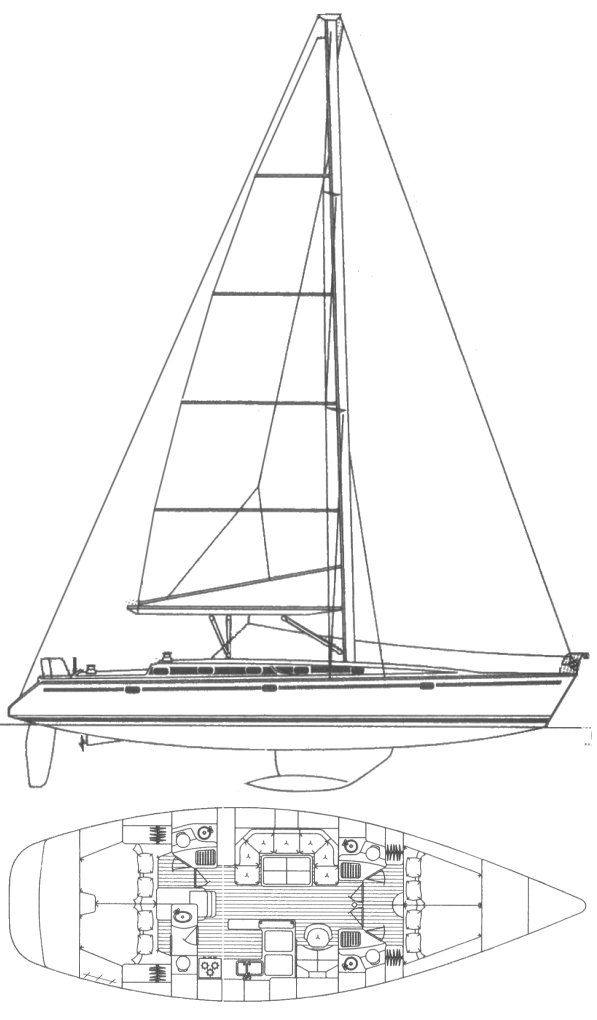The Moorings International 50 is a robust and spacious monohull sailboat, specifically designed for the demanding environment of crewed yacht charter. Built by the renowned French shipyard Jeanneau for The Moorings Yacht Charter company starting in 1994, this vessel combines comfortable living with capable sailing performance in a package well-suited for extended cruising. With an overall length of nearly 50 feet and a substantial beam of almost 16 feet, she offers considerable volume both on deck and below, crafted to provide an enjoyable experience for guests and crew alike.
International 50 (Moorings) Information, Review, Specs

- Make
- Moorings
- Model
- International 50
- Number Built
- Production Year(s)
- 1994 - ??
The genesis of the International 50 can be traced to 1994, when Jeanneau embarked on its production for The Moorings Yacht Charter. The design was entrusted to the esteemed naval architect Bruce Farr, known for his ability to blend performance with practical cruising considerations. Farr's philosophy, in this instance, focused on creating a dedicated cruiser for the charter market, emphasizing space, comfort, and ease of handling for a professional crew.
During the mid-1990s, when the International 50 was introduced, Jeanneau, under the ownership of Groupe Beneteau since 1995, maintained its reputation for quality, innovation, and a commitment to creating "liveable boats." The shipyard was embracing advanced construction techniques like resin infusion molding for larger models, aiming for enhanced performance and durability, which would have benefited a vessel intended for intensive charter use. The collaboration with The Moorings meant that the International 50 was built to withstand the rigors of charter operations while providing a comfortable and elegant platform for sailing vacations. The boat features a masthead sloop rig and a wing keel, indicative of a design intended to offer both steady performance and reduced draft for access to varied cruising grounds.
Sailing Performance and Handling
The International 50 is designed as a capable cruiser, balancing a comfortable motion with respectable sailing characteristics for a yacht of its size and purpose. With a reported sail area of 1205 square feet and a displacement of 33,000 pounds, it has a sail area to displacement ratio (SA/D) of approximately 18.7. This ratio suggests that the International 50 is a moderately powered vessel that should perform well in a range of wind conditions, likely excelling in light to moderate breezes.
The displacement to length ratio (D/L) of approximately 194 places the International 50 firmly in the medium-light displacement category for a vessel of its waterline length. This indicates a design leaning towards efficiency and a lively feel, rather than being an overly heavy or sluggish cruiser. Anecdotal accounts praise the International 50 as being "big, beautiful, comfortable and fast," noting its "streamlined hull is extremely quick and maneuverable for a cruiser this size." However, as with many larger cruisers, its performance can be affected if heavily loaded with crew and provisions, leading to a degree of speed reduction. The wing keel contributes to good upwind performance and reduced leeway, while offering a shallower draft than a traditional fin keel, expanding its accessibility to various anchorages. The masthead sloop rig provides a straightforward and powerful sail plan, making it manageable for charter crews. Detailed ballast figures for the International 50 (Moorings) are not readily available in published specifications, precluding a direct calculation of its ballast to displacement ratio.
Accommodations and Layout
Designed specifically as a crewed yacht charter vessel, the Moorings International 50's interior layout prioritizes comfort, privacy, and functionality for multiple guests and crew. While specific diagrams or detailed reviews of its exact interior arrangement are not widely available, its purpose implies a configuration optimized for a luxurious cruising experience.
Typical for a 50-foot charter monohull of its era, one would expect multiple private cabins, likely including a spacious master suite and several guest cabins, each with en-suite or dedicated head and shower facilities. Common arrangements would feature a well-appointed main salon for dining and lounging, a practical galley designed for efficient meal preparation at sea, and ample storage for provisions and personal gear. Given its role as a "crewed yacht," the layout likely incorporates considerations for crew accommodations that may be separate or easily separated from guest areas to ensure privacy and operational efficiency. The emphasis would have been on durable, attractive finishes, good natural light, and effective ventilation to enhance comfort in tropical charter destinations.
Measurements
Construction & Hull
- Construction Material
- Fiberglass (Solid)
- Hull Type
- Monohull Sailboat
- Keel Type
- Wing
- Rudder
- 1x —
- Ballast
- -
- Displacement
- 33000 lbs
- Water Capacity
- -
- Fuel Capacity
- -
Engine
- Engine Make
- Perkins
- Engine Model
- —
- Engine Type
- —
- Engine HP
- 85
- Engine Count
- 1
- Drive Type
- —
- Fuel Type
- Diesel
Rig & Sails
- Rig Type
- Masthead Sloop
- P (Main Luff)
- -
- E (Main Foot)
- -
- I (Foretriangle Height)
- -
- J (Foretriangle Base)
- -
- Forestay Length (est)
- -
- Main Sail Area
- -
- Foretriangle Sail Area
- -
- Total Sail Area (Reported)
- 1205 sqft
- Total Sail Area (Calc)
- -
Dimensions
- LOA
- 49.75 ft
- LWL
- 42.33 ft
- Beam
- 15.92 ft
- Draft
- 6 ft
- Max Headroom
- -
- Air Draft
- -
Calculations
- Hull Speed
- 8.72 kn
- Pounds per Inch Immersion
- 2